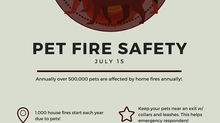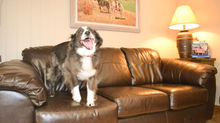Noise Phobias
- Jun 15, 2016
- 4 min read

Jax, a 5 year old coonhound mix began suffer from noise phobia at 1 year of age and retired from hunting. The phobia gradually increased to the point that she would attempt to jump out of windows if she heard thunder, gun shots, or fireworks. July 4th 2013, Jax broke down her family's back door, jumped over their 6ft tall fence and was hit by a car two miles from her home. She suffered from multiple cuts and broken hips. Jax had to undergo extensive orthopedic surgery - all due to an extreme case of noise phobia.
How would I know if my pet suffers from noise phobia?
Does your dog ever hide under your bed or want to be held during a thunderstorm? Or do they startle and cower with the sound of a gun shot? Tremble with the 4th of July celebrations and even have "accidents" in the house?
Your pet may suffer from noise phobia, one of many anxiety disorders in dogs and even cats. Your pet may suffer from other generalized anxiety (separation anxiety of fear of meeting new people etc.) or they may be perfectly happy and calm members of your family - until a gun shot or fireworks go off.
Just like all disorders, each pet is effected differently. Some pets may suffer from mild symptoms - such as hiding under the bed or wanting to stay inside during thunderstorms. On the other hand, you pet may suffer from extreme anxiety and have dramatic symptoms - including "panic attacks" where they are prone to injure themselves trying to escape the noise.
Common injuries resulting form noise phobia include injuries to the mouth or paws from digging/biting to escape to lacerations from tearing apart doors or jumping through windows. Your pet may bolt as a result of the phobia - causing them to be hit by a car or become lost (a huge problem for families that travel over the 4th of July holiday).
In many cases, the phobia only worsens with time. As anxiety can lead to a variety of health and behavioral issues, we recommend that even mild noise phobias be addressed as soon as symptoms appear.
What can be done to help my pet?
The most important thing to help your pet is to provide a safe and comfortable "safe place." This safe place should be a room of the house away from noises and a room that they are happy in. It is important to make this area a happy area - do not send your pet there for punishment. We recommend crate training your dog as a puppy for many reasons - but most notably, if your pet begins to suffer from noise phobia crate training is invaluable for both your pet and yourself! Pets often feel safest in a small space with familiar surrounds. For large dogs, bathrooms, closets, or special nooks in the house may work as well. Place your pet's favorite bed, toys, and treats to help make your pet as comfortable as possible.
Many pets also benefit from white noise that helps drown out the noise that causes them to react. There are many white noise machines on the market, but a fan or calming music can be just as effective for your pet. Check out youtube for music specifically composed for animals.
Some pets need to be physically comforted - but this depends on the pet. Never leave a child unattended with a pet that suffers from noise phobia during their trigger (ie thunderstorm or 4th of July). Even the most calm and gentle pet may bite out fear. In some cases, simply being inside doing normal day-to-day activities with your pet reassures your pet that everything will be OK. In more active dogs, we recommend playing a game such as tug of war or indoor fetch to help your pet keep their mind off of the noise.
Just like a soft wrapped blanket calms a child, some pets find calm in the "swaddling" of anxiety wraps or ThunderShirts. These shirts function just like swaddling a baby, the soft constant pressure hugs the body and helps the pet calm down during their trigger events.
What if my pet suffers from extreme anxiety and still needs more help?
Some pets may benefit from pharmaceutical products designed to help with anxiety. There are many products on the market, but like with humans, what drug works for one pet may not work for the other. For pets that suffer from generalized anxiety, daily long-term medication, such as Prozac, may be beneficial. For specific noise phobias, pets with mild symptoms may benefit from StormStress a tablet that is dissolved in their water or Zylkene, a milk casein capsule that helps naturally calm your pet. Many people also find that pheromones works for their pet. For more severe cases, other medications such as sedatives may be used during the trigger event. Depending on the medication, treatment should be started prior to the expected trigger event for full effect.
As with all medical issues - it is best to prevent and proactively treat. If your pet has suffered from noise phobia or you suspect that you pet does suffer from it, please call us at (402)376-1500 or book an appt online using the tab at the top of the page to discuss with Dr. Wood what treatment plan is right for your pet.


















Comments